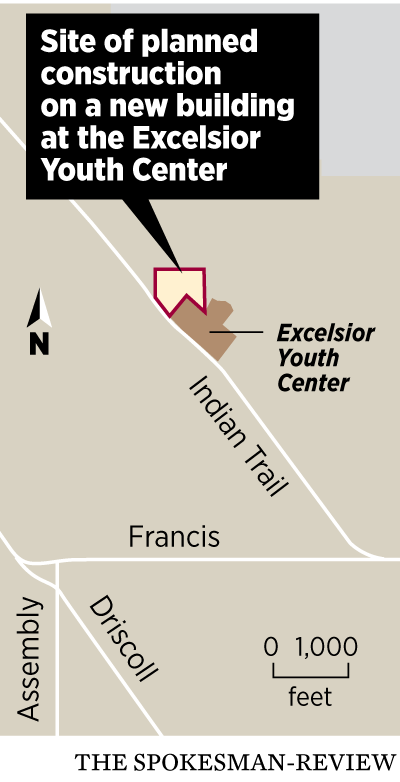Youth treatment center allowed to expand despite upset neighbors

Despite the ire of some neighbors, the Excelsior Youth Center in north Spokane is permitted to move ahead with the construction of a new 22,000 square-foot, 16-bed youth transition facility on its campus, the Hearing Examiner’s Office recently announced.
Excelsior has faced past criticism for crimes committed by its clients, including an alleged rape that occurred in an abandoned house near the facility in December.
In each case, the crimes were committed by runaways from the facility.
In his ruling on March 29, Spokane Hearing Examiner Brian McGinn made note of residents’ concerns over the large amount of police calls made to the facility and the apparently higher-than-normal petty crime rates that are believed to be carried out by its clients.
But he concluded that, while the neighbors made some “persuasive contentions,” that they came with a lack of evidence linking Excelsior’s clients to the crimes. And even if the crimes were committed by Excelsior’s clients, the blame shouldn’t be put on the center.
He also doubted that adding 16 residents would have a “measurable impact on the neighborhood,” and that Excelsior’s original plans called for a much bigger facility.
There to represent the community were three neighbors who lived within a few hundred yards of the facility.
Mark Anderson, who lives in a house on West Osage Way that sits atop a large hill near the north end of Excelsior’s campus, had an issue with how Excelsior went about informing neighbors of the expansion, despite his neighborhood being relatively close.
“Even though their property is right below us, they didn’t let us know,” he said Thursday on his porch.
In the past and especially around summer time, he said it wasn’t rare to see Excelsior’s clients rummaging through vehicles and setting fires in the woods near his neighborhood.
“Kids would come right up here,” he said, pointing to a section of hillside being prepared for a new eight-home housing development. “They’d have bonfires in the trees, during the summertime. That ain’t right.”
In 2014, then-City Attorney Nancy Isserlis wrote that Excelsior was “the largest single consumer of law enforcement resources for the Spokane Police Department,” drawing roughly 110 calls for service each month.
Most of those calls were for reported runaways, but police also were concerned about assaults on staff members, clients who hurt themselves and crimes in the area possibly committed by Excelsior clients. A 2014 investigation by the state Department of Health, however, found no deficiencies in Excelsior’s practices
At the hearing to represent Excelsior was CEO Anderson Hill, who said Thursday that he’s heard from many of the community members, either through community meetings organized by Excelsior and held on its campus or during the Hearing Examiner’s meeting.
In each instance, he said he’s worked with them to dispel misunderstandings, including a persistent one that Excelsior should consider locking their doors. The center is not a prison nor a mental hospital. It cannot force clients to stay.
He also pointed out to the Hearing Examiner that “young people are committing similar crimes all over Spokane” and that it’s “not hard to accept that this problem has reached epidemic proportions,” McGinn wrote.
Hill also reiterated Excelsior’s duel commitment to the safety of the community and the clients.
“Part of what’s helpful to us is helping people understand that Excelsior doesn’t want anything bad to happen to these kids,” he said. “We know that trauma as a child can lead to long-term health conditions as adults.”